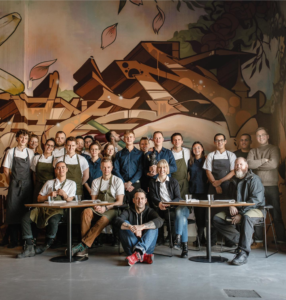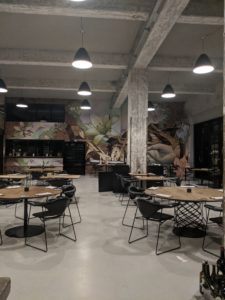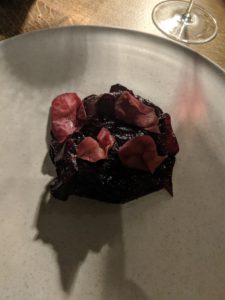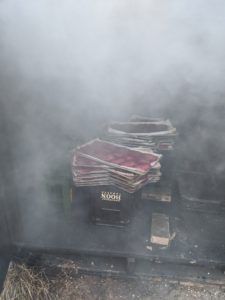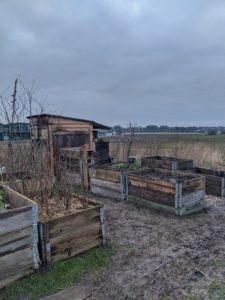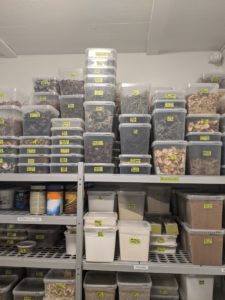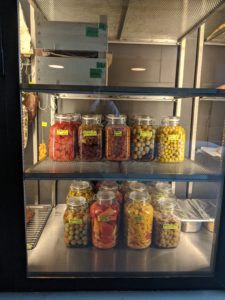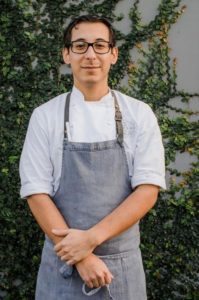
Why did you select Amass for your stage?
I chose to go to Amass for several reasons, but primarily to witness how a restaurant can be centered around sustainability and leading the industry on zero waste practices. I was hoping to learn more about how it is possible to keep track and implement so many systems to mitigate and minimize waste, recycle properly, and have near 100% yield on ingredients. One of the other reasons was due to many recommendations from past teammates who have had fantastic stages with Chef Matt and the Amass team.
What experiences were you able to learn and grow from?
Chef Matt’s philosophy on running a kitchen was the most valuable thing I learned and will grow from. It is the uncompromising habit of not tossing anything that can somehow be used a second or even third time. We are taught very early as cooks that every ingredient has some trim or waste but Matt’s answer to questions like, “Should I keep the [.......] part?” is always: “Of course”. He helps you retrain your habits and thoughts to never first consider tossing a byproduct. This logic helps in so many ways, often driving creativity or forcing progress for the team. These guidelines and rules are some of the key things I learned that I hope to bring back to my colleagues back at SingleThread, to help us continue our work on attaining better sustainability and a positive environmental imprint.
Which dish/technique/method stood out to you the most?
I was very fortunate to get the opportunity to dine my last night of the stage with my brother who decided to visit me. The complete meal and experience was fantastic, but even during my time in the kitchen, the one dish that I was drawn to was the Monster Beetroot. The interest was in the idea and method of the growing of the beet: leaving it in the soil all winter to hibernate and concentrate. The result is a massive beet that has a deep flavor and unique texture. After the beets are roasted and peeled, they are then sliced thin and treated like preserving meat: smoked, dried, and stored until needed. They are then lightly rehydrated to create a very savory substantial vegetable with an incredible tooth and tenderness. The dish is accompanied by summer flower vinegar, walnut oil, walnut pulp custard, walnuts dressed in a preserved rhubarb, and plum vinaigrette all either preserved from the summer or a byproduct repurposed. Altogether is a fantastic combination of flavors that truly highlights the intensity of this beet while balancing it with the acidic fruits and nutty custard. This drying and rehydrating technique is something that stood out the most to me that was present in a few other ways throughout the menu. Additionally, the fermentation and preservation program gave me a better understanding of those methods and options to preserve or reuse products.
One other habit that stood out was the removal of single use plastic products such as trash bags and plastic wrap. It made you rethink how certain projects or storage practices are done -things ingrained in chefs very early on. The question isn't if it was quicker or more efficient but rather is it a necessity? An exception was made only for cryo-vac bags, although saved for certain projects or storing needs that would last months at least to ensure fewer bags used. Although it was also very important to rinse/clean the bags and store separately than hard plastics to then be recycled specifically. This insistent practice, though uncommon, was treated with the same care one would any ingredient or law of the kitchen that is followed without question. This new habit formed is one of the key characteristics that makes Amass stand out from other restaurants in the world and the perspective that will lead the conversation in the future.
How will your stage experience impact your career in the future?
This opportunity to travel and stage at Amass will impact my future by giving me a broader perspective and more connections to draw from that will last the rest of my career. Meeting people from all over the world and living in a city like Copenhagen was a priceless experience. I hope to keep in contact with the countless people I met and befriended both within and out of Amass. I also believe that I gained a new perspective on what can be done in a restaurant, and the steps that one can take to make a positive impact. Chef Matt’s team is pushing many fronts on how to have a restaurant with a clear mission that advocates for the environment. Spreading the kind of thinking that he leads with how and why restaurants should exist is what will hopefully progress the industry to more positive directions, both in culture and environmentally. Directly this experience has given me a new habit to practice and a different thought process with a basket of tricks to draw from that will make things new and exciting for me. This experience as a whole has reinvigorated and rejuvenated me as a cook.
